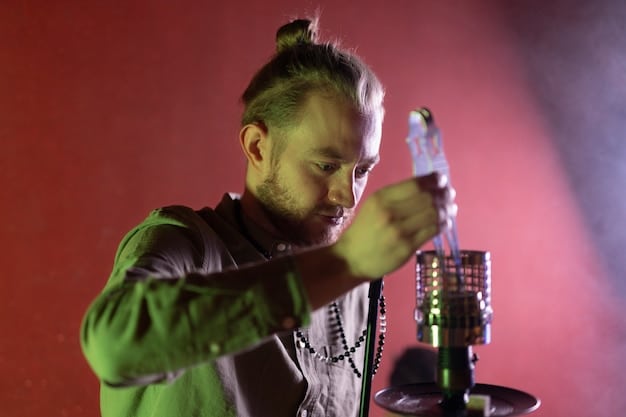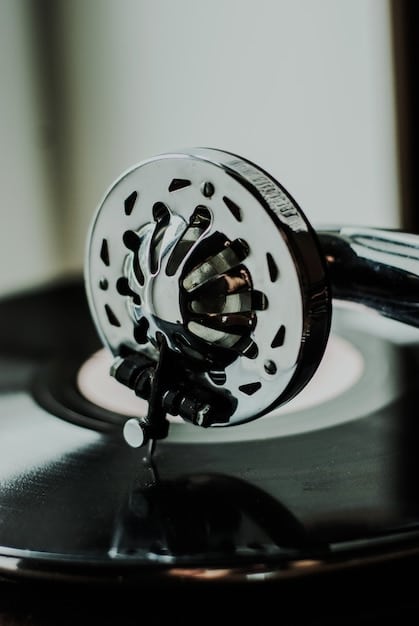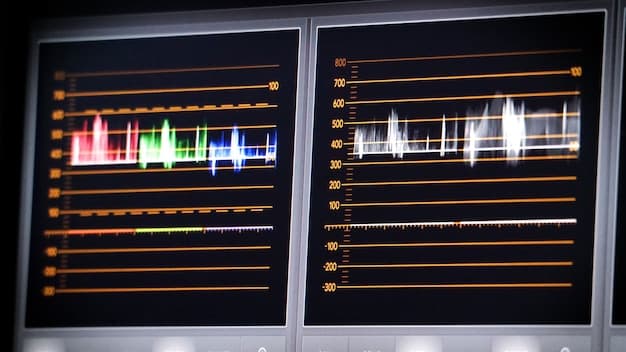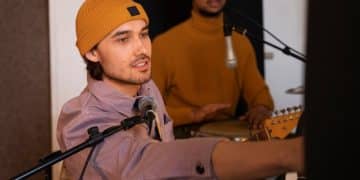Emerging US Rap Artists: Copyright Law in the Digital Age

Emerging US rap artists must understand copyright law to protect their music in the digital age, covering creation, ownership, and enforcement to safeguard their creative work.
The music industry can be a minefield, especially for emerging artists. As emerging US rap artists navigate the complexities of building their careers, understanding copyright law is crucial for protecting their creative work in the digital age. This article will guide you through the essentials of copyright, ensuring you can safeguard your music and build a sustainable career.
Understanding Copyright Basics for US Rap Artists
Copyright law grants creators exclusive rights over their original works, including musical compositions and recordings. For rap artists in the US, this means protecting your lyrics, beats, and overall sound. Understanding the basics of copyright is the first step in securing your artistic creations.
What Does Copyright Protect?
Copyright protection extends to various elements of your music. This includes:
- Lyrics: The written words of your rap songs.
- Musical Composition: The underlying melody, harmony, and rhythm.
- Sound Recording: The recorded performance of your song.
How to Obtain Copyright Protection
Copyright protection is automatic the moment you create an original work and fix it in a tangible medium, such as writing it down or recording it. However, officially registering your copyright with the U.S. Copyright Office provides additional legal benefits.

Registering your work allows you to:
- Sue for infringement in federal court.
- Potentially recover statutory damages and attorney’s fees.
- Create a public record of your copyright claim.
Understanding these basics empowers you to take proactive steps in protecting your creative work. Being informed from the outset can save you significant time and resources down the line.
Registering Your Copyright: A Step-by-Step Guide
While copyright protection is automatic upon creation, registering your work with the U.S. Copyright Office provides significant legal advantages. This section will provide a step-by-step guide to navigating the registration process for emerging US rap artists.
Step 1: Preparing Your Application
Before you begin the online registration process, gather the necessary information:
- Title of the Work: The official name of your song or album.
- Author(s): The names of the individuals who created the work.
- Copyright Claimant(s): The person or entity who owns the copyright.
- Publication Information: If the work has been published, include the date and country of first publication.
Step 2: Creating an Account with the U.S. Copyright Office
Visit the U.S. Copyright Office website (www.copyright.gov) and create an account. This will allow you to access the online registration system.
- Go to the official website
- Create an account
- Follow guided steps
Step 3: Completing the Online Application
Once you have an account, you can begin the online application process. The Copyright Office uses an electronic registration (eCO) system. You will need to select the appropriate category for your work (e.g., sound recording or musical composition) and provide the required information. Be sure to complete all required fields accurately.
Remember to fill out correctly:
- Authors
- Dates
- Information about publishing if applicable
Step 4: Submitting Your Deposit Copy
As part of the registration process, you must submit a copy of your work to the Copyright Office. This can be done electronically for sound recordings and certain musical compositions. Ensure your deposit copy accurately represents the work you are registering.
By following these steps, emerging rap artists can effectively register their copyrights and protect their creative assets.
Understanding Music Licensing for Rap Artists
Music licensing is a critical aspect of copyright law for rap artists, allowing you to control how your music is used by others and generate income. This section explores the key types of licenses and how they apply to your work as an emerging US rap artist.
Licensing means a rap artist can:
- Earn money from their track
- Choose who has rights to their track
- Protect from copyright infringement
Types of Music Licenses
There are several types of licenses relevant to rap music:
Mechanical License: Grants permission to reproduce and distribute a copyrighted musical composition (e.g., on CDs, digital downloads).
Synchronization License: Allows the use of a song in visual media, such as movies, TV shows, or video games.
Public Performance License: Grants the right to publicly perform a song.
Working with a performing rights organization (PRO) means that they can do the leg work for you. Typically you earn royalties from it too!
Working with Performing Rights Organizations (PROs)
PROs like ASCAP, BMI, and SESAC collect and distribute public performance royalties on behalf of songwriters and publishers. Affiliating with a PRO can streamline the licensing process and ensure you receive compensation for public performances of your music.

Navigating music licensing can be complex, but understanding the different types of licenses and working with PROs can help you protect your rights and monetize your music effectively.
Protecting Your Brand: Trademarks and Stage Names
In addition to copyright, trademarks play a vital role in protecting your brand as an emerging US rap artist. Your stage name, logo, and other branding elements can be registered as trademarks, preventing others from using them and potentially confusing your fans.
What is a Trademark?
A trademark is a symbol, design, or phrase legally registered to represent a company or product. For rap artists, this can include your stage name, logo, or album titles.
It’s worth trying to protect trademarks so that:
- Nobody else can use your band/artist name
- Protects your reputation
- Another artist can’t mislead fans
Benefits of Trademark Registration
Registering your trademark with the U.S. Patent and Trademark Office (USPTO) provides several benefits:
- Legal Protection: The right to sue for trademark infringement.
- National Recognition: Establishes your ownership of the mark nationwide.
- Deterrent: Deters others from using a similar mark.
How to Register a Trademark
Start by conducting a thorough search of existing trademarks to ensure your desired mark is available. Then, file an application with the USPTO, providing details about your mark and how you intend to use it. The USPTO will review your application and, if approved, register your trademark.
Protecting your brand through trademarks is essential for building a unique identity as an artist and preventing others from profiting from your hard work. A strong trademark protects you now and in the future.
Copyright Infringement: What to Do if Your Music is Stolen
Despite your best efforts, copyright infringement can still occur. Knowing how to respond when your music is stolen is crucial for protecting your rights and seeking legal remedies. Copyright law covers: emerging US rap artists.
Identifying Copyright Infringement
Copyright infringement occurs when someone uses your copyrighted work without your permission. This can include unauthorized reproduction, distribution, or public performance of your music.
Examples include:
- Unauthorised track use
- Unauthorised track remix etc.
- Illegal downloads made of your tracks
Steps to Take When Infringement Occurs
If you believe your copyright has been infringed, take the following steps:
- Document the Infringement: Collect evidence of the unauthorized use.
- Send a Cease and Desist Letter: Demand that the infringer stop using your work.
- Consider Legal Action: If the infringement continues. If a settlement cannot happen then legal action may be necessary.
Consulting with an attorney who specializes in copyright law is highly recommended to assess your legal options and protect your interests.
Navigating the Digital Landscape: Online Music Platforms
The digital age presents both opportunities and challenges for emerging US rap artists. Online music platforms like Spotify, Apple Music, and YouTube are essential for reaching a wider audience.
Understanding Platform Licensing Agreements
Before uploading your music to these platforms, carefully review their licensing agreements. These agreements outline how your music will be used, how royalties will be calculated, and your rights as a copyright holder.
Important things to look out for include:
- How royalties are paid
- How music is used
- What the copyright agreement is
Protecting Your Music on Social Media
Social media platforms can be powerful tools for promoting your music, but they also pose risks of copyright infringement. Use watermarks on your images and videos to deter unauthorized use, and monitor these platforms for potential infringement.
By understanding platform licensing agreements and taking proactive steps to protect your music on social media, you can maximize your reach while safeguarding your copyright.
| Key Concept | Brief Description |
|---|---|
| 🎵 Copyright Basics | Protection for lyrics, music, and recordings. |
| 📝 Registration | Register with the U.S. Copyright Office for legal benefits. |
| 💼 Music Licensing | Mechanical, synchronization, and public performance licenses. |
| 🛡️ Trademarks | Protect artist name and brand elements. |
FAQ
Copyright law protects your original musical compositions, including lyrics, melody, and sound recordings. This protection prevents others from using your work without your permission.
Registering your copyright with the U.S. Copyright Office allows you to sue for infringement in federal court and potentially recover statutory damages and attorney’s fees. It also creates a public record.
A music license grants permission to use copyrighted music in certain ways. You need licenses to allow others to reproduce, distribute, perform, or synchronize your music with visual media, generating income and maintaining control.
PROs like ASCAP, BMI, and SESAC collect and distribute public performance royalties on behalf of songwriters and publishers, ensuring you receive compensation when your music is publicly performed.
Document the infringement, send a cease and desist letter, and consider legal action if the infringement continues. Consulting with a copyright attorney is highly recommended to assess your legal options.
Conclusion
Understanding and enforcing copyright law is crucial for emerging US rap artists. By taking proactive steps to protect your music, you can secure your creative work and build a successful career in the industry.





